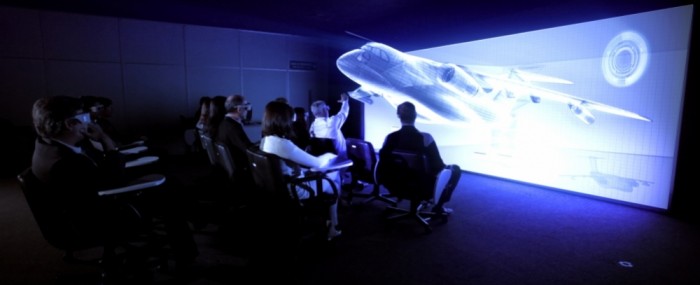
Engineering Center for Aerial Mobility of the Future starts operating
21 de março de 2023By Elton Alisson | FAPESP Innovative R&D – The world’s aviation industry has pledged to achieve carbon neutrality by 2050. This means balancing human carbon emissions with absorption by carbon sinks so that emissions fall to zero on a net basis. To help the Brazilian aviation industry meet this and other challenges, such as the development of minimally crewed and autonomous flight-capable civilian and military aircraft, the Engineering Research Center for the Aerial Mobility of the Future (ERC-AMF) was launched on March 14 at the Aeronautical Technology Institute (ITA) in São José dos Campos, São Paulo state (Brazil).
Established by FAPESP and Embraer, the center will receive investments totaling BRL 48 million in the next five years and will have more than 120 researchers, with Embraer’s engineers playing a major role. The mission is to conduct studies on innovative topics with the potential to contribute to the competitiveness of the Brazilian aeronautical sector.
Besides ITA, the institutions participating in CPE-MAF include the State University of Campinas (UNICAMP) and – currently in the process of joining the initiative – the University of São Paulo’s São Carlos School of Engineering (EESC-USP).
“The combined forces of these giants – FAPESP, Embraer, ITA and UNICAMP – in this Engineering Center for the Aerial Mobility of the Future will certainly produce positive results. A great many innovations will come out of this center,” said São Paulo State Governor Tarcísio de Freitas in the ceremony held to unveil the center. “This alliance of human resources, technology and investment by FAPESP and Embraer will be a huge success. We will have new disruptive technologies.”
ERC-AMF will be one of the Engineering Research Centers (ERCs) set up by FAPESP in partnership with private enterprise and hosted by different research institutions in São Paulo state.
Launched in 2012, the ERC program leverages synergies between the business and academic sectors to produce and disseminate world-class research with a significant economic and social impact via innovation.
“We currently support 27 such centers. Investment is to total BRL 1.5 billion, of which BRL 400 million from FAPESP, with matching allocations from companies like Ericsson, GSK and IBM,” said Marco Antonio Zago, President of FAPESP. “This center and similarly powerful initiatives reveal the new face of FAPESP, which continues to provide strong support for basic research as well as programs to train human resources, and is now also backing these practical applications.”
Research lines
ERC-AMF will conduct research in three priority areas of interest to Embraer: low-carbon aviation, autonomous systems and advanced manufacturing. Research lines aimed at reducing emissions, for example, will involve machine control for electric propulsion and aeropropulsion integration for electric aircraft.
“Aeropropulsion integration for electric aircraft encompasses the entire aerodynamic and structural design of this type of aircraft with distributed propulsion across more than two engines. This entails a number of modifications that have to be properly considered in the design stage,” said Domingos Alves Rade, a professor at ITA and ERC-AMF’s principal investigator.
Other research lines will involve the development of decision-making methods for autonomous systems to enable aircraft to fly with full or partial autonomy, and advanced design for metallic additive manufacturing and final assembly of aircraft with collaborative robotics. “This research line will pursue collaborative robotized solutions that serve as a basis for a human-robot division of labor in smart final assembly of aircraft,” Rade said.
In addition to conducting scientific research, the center will promote the transfer of technology to existing firms and companies yet to be established. It will also be expected to disseminate information and knowledge to university and high school students.
“The center will contribute to education and training, as well as developing technology that fuels the longevity, competitiveness and excellence of the Brazilian aerospace industry and helps assure the sustainability of aviation as a mode of transportation, creating value for Brazilian society,” said Luís Carlos Affonso, Embraer’s Vice President of Engineering and Corporate Strategy.
The ceremony was also attended by Felício Ramuth, Vice Governor of São Paulo State; Vahan Agopyan, São Paulo State Secretary for Science, Technology and Innovation; Air Force Lieutenant Brigadier Maurício Augusto Silveira de Medeiros, Director General of the Department of Aerospace Science and Technology (DCTA); Anderson Ribeiro Correia, Rector of ITA; Carlos Américo Pacheco, CEO of FAPESP; Luiz Eugênio Mello, Scientific Director of FAPESP; and Fernando Menezes, Chief Administrative Officer of FAPESP.
“We must ensure that FAPESP continues to operate along these lines while respecting its autonomy. This and similar initiatives show that we have a win-win situation,” said Agopyan. “It’s a win for Embraer and its domestic and foreign partners, for ITA, for the Government of São Paulo State, and above all for the people of Brazil and especially of this state, because the initiative will strengthen the productive sector in the state with next-generation technology at the cutting edge of the knowledge frontier.”
